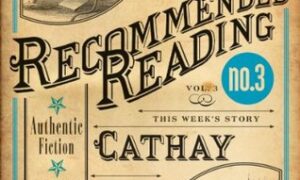 The Annie Year by Stephanie Wilbur Ash
The Annie Year by Stephanie Wilbur Ash
My rating: 3/5 cats



Life is essentially unknowable in the middle parts. Only the very beginning and very end are certain: We are born. We die. All we know of the middle part is to pay our taxes.
before i received this book as part of my literary subscription box from quarterly, greg had shown it to me at the store, saying “look, it is funny grit lit!” which seemed a promising novelty—i love grit lit, but it is not a genre typically characterized by humor.
as it turns out, despite its smalltown setting, restless teens, and exploding meth labs, this is not at all grit lit. and i’m not even sure if it’s funny. there are definitely humorous elements, but the delivery is so dry, it’s not always easy to determine where the laugh track should be.
it’s one of those books that sort of happens to you as a reader, where the plot unfolds without trying to engage you by way of the action or the narrator.
the things that are good about this book are mostly tied to location, and the narrator’s description of the particulars of the small midwestern town in which she lives. how small is it? well:
Main Street was unusually thick with cars—six in two blocks. Someone was even forced to parallel park.
which is a perfect, succinct way to relate everything you need to know about this town, where everyone knows everything about everyone, and pizza by the slice is unheard of. even though i now live in the multi-ethnic and diverse socioeconomic paradise that is queens, i hail from a new england village too tiny to even be called a town. so i have firsthand experience with some of these observations, and i appreciated her descriptions of the very insular relationships that dominate such places.
i just never felt like i understood the narrator.
tandy caide, CPA is very practical, and she prides herself on being a person of integrity, but in many ways she isn’t really a person at all, more of a figurehead or some kind of oracle of financial concerns, privy to all the money matters of the town, tidying their receipts, assessing their worth in sums and figures, keeping their confidentiality, fixing their troubles:
I am solving all the tiny problems of all the people in this town using simple mathematical equations found on worksheets provided by the state and federal governments, with rules prescribed to me specifically by a series of books shelved within my fingertips’ reach behind the desk, which are also found on the Internet in an easily searchable format. The people in this town bring me their problems in shoe boxes and grocery sacks and giant messy purses, and I file them into perfectly coherent little reports to be read by that giant thing that is the government. All those little problems of all those little people in this town get accounted for, made right, reported on, and stamped as true and unwavering by me: Tandy Caide, CPA.
numbers-person rigidity is one thing, but there’s something almost anhedonic about her. she’s married, although their relationship is mechanical, and her husband checks himself into a clinic pretty early on in the book, which frees her up to have an affair with the new ponytailed vo-ag teacher, who she refers to as ‘the vo-ag teacher,’ and with whom she has much sex, but there’s little emotional connection on her part. she’s uninterested in making the effort towards typical human interactions, but it’s never explored in any psychological explanatory way, it’s just presented as factual:
I could have taken the day off to drive him to the Mayo Clinic. I just didn’t want to. I didn’t want to sit next to him in the car for an extended period of time, and then learn about his problems, and then talk to him about his problems, and then help him with his problems. You know—all the things a good wife would do.
and, with the vo-ag teacher, later:
…he came back and put his head in my lap and he cried.
I held him for a while. I tried not to look at him—this grown man crying—but I couldn’t help it. I looked, and it was awful. His face was blotchy and red and screwed up in a desperate, ugly way. It was one of the most awful nights of my life, not because I was heartbroken, but because he was. It is heartbreaking to watch a heartbroken person cry when there is nothing you can do to help him.
Then we made love again. He fell asleep immediately after.
it’s not that there was ‘nothing’ she could do, she just—as with her husband earlier—wasn’t interested in helping, experiencing nothing more than a clinical disgust at the situation.
which is fine, lack-of-affect is not really a turn-off for me in my characters, but it’s hard to understand motivation in a character like this, and many of her actions remain inexplicable. not the affair(s), those are a means to an end, but her abandonment of barb, her high school best friend—going against her own wishes to visit her and her new baby when she returns home from college just because her father and his best friend who happens to be barb’s father (small town—check) dissuade her—i needed more of a reason for that to make sense to me.
she addresses this inability to understand her, near the end of the book:
Perhaps you understand this. Perhaps you do not.
Perhaps people like you do not understand people like me. Perhaps you can’t understand me. Perhaps no amount of concrete evidence surrounding why it is that I do certain things and not other things, no amount of explaining myself with touchy-feely heart-to-heart talking about my Very Important Feelings, will ever make someone like you understand someone like me.
That is not my problem.
And even if it were my problem, I wouldn’t do anything about it anyway, because obviously I have much bigger problems than you.
but it’s still a bit unsatisfying, particularly since she’s not really speaking as an individual here, but as a part of a collective “us vs. you” opposition that has been running through the entire novel, which is structured as an explanation of events addressed by tandy to some unspecified audience, peppered with remarks establishing a distinction made between smalltown folks like her and her people, and the addressees—big city people living near rivers where pizza can be bought by the slice.
i didn’t dislike the book, but its cold and impersonal tone along with the questions i still have about the identity of tandy’s audience &etc. meant i didn’t really love it, either. and i so wanted to, because smalltown/smallpress is my jam, but alas.
i will say i totally understand why whitaker chose this as a box-accompaniment to her own novel—there are definite touchpoints, but The Animators brings more to the table to gorge upon.
***********************************************

the third book in my second literary subscription box from quarterly. huzzah!!!
review to come.
read my book reviews on goodreads







